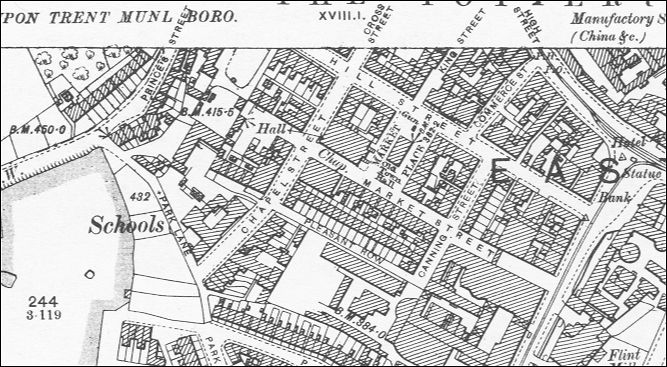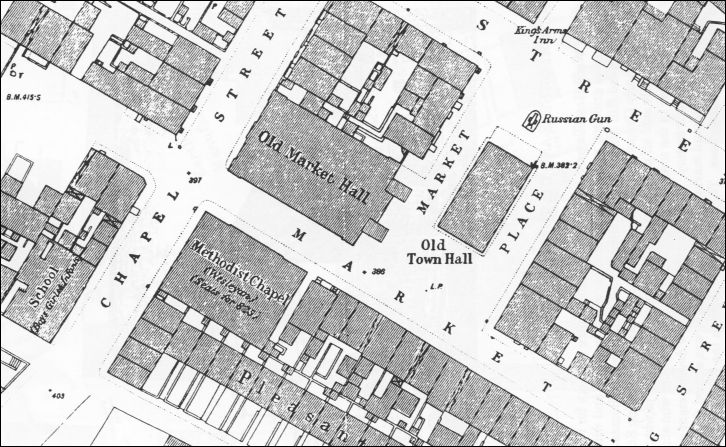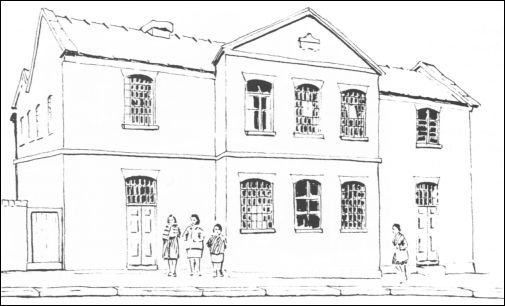![]()
![]() |
index: R |
|
index: R |
Thomas Robey
[ Web Site Index ]
| People from Stoke-on-Trent | |
|
|
|
|
Thomas Robey |
[ Web Site Index ] |
Thomas ROBEY (1800/1 - ?) - Schoolmaster, Stoke-upon-Trent
| father: ? | mother: ? |
| Thomas Robey | 1st wife: Abigail (d.1858) 2nd wife: Mary |
| c. 1800 | Born in Warrington, Cheshire (probably the younger brother of William Robey). |
| 1822 | By this date Thomas was running the "Commercial Academy, Church Street, Hanley. |
| 1841 | By this date he rented a
room in the recently built schoolroom of the Wesleyan Methodists in
Market Street in the town of Stoke-upon-Trent. He ran a private school
from here. A 1850 advertisement claimed that his was the largest voluntary school in the county of Staffordshire. |
| 1842 | His daughter (by his first wife, Abigail) - Elizabeth Hannah Robey died in infancy. They were living in Cross Heath Street, Stoke-upon-Trent. |
| 1851 | According to the 1851 census he was living in Princess Street. |
| 1861 | According to the 1861 census he was living in Market Street with his second wife Mary and stepchildren. |
| 1868 | Thomas Robey was evicted from the schoolroom premises because of his failure to pay the rent. |
NOTE: William Robey (probably Thomas's older brother was a schoolmaster in the town of Longton)
1851
Census
11 Princess Street, Stoke-upon-Trent, Staffordshire
| Name | Estimated Birth Year | Birthplace | Relationship | Occupation |
| Thomas Robey | abt 1801 | Warrington, Lancashire, England | Head | Commercial Schoolmaster |
| Abigail Robey | abt 1803 | Wern, Shropshire, England | Wife | Commercial Schoolmistress |
| Mary Robey | abt 1827 | Market Drayton, Shropshire, England | Daughter | Assistant Governess |
| James Robey | abt 1829 | Market Drayton, Shropshire, England | Son | General assistant teacher |
| Peter Robey | abt 1835 | Market Drayton, Shropshire, England | Son | General assistant teacher |
| Thomas Robey | abt 1832 | Market Drayton, Shropshire, England | Son | General assistant teacher |
| Jane Robey | abt 1837 | Market Drayton, Shropshire, England | Daughter | scholar |
| Catherine Caldwell | abt 1837 | Warrington, Lancashire, England | Servant | General Servant |
NOTE: in the early 1950's Honeywall, Princess Street and Upper Cliffe Bank were all renamed as Honeywall and the houses were re-numbered.
1861
Census
109 Market Street, Stoke-upon-Trent, Staffordshire
| Name | Estimated Birth Year | Birthplace | Relationship | Occupation |
| Thomas Robey | abt 1801 | Warrington, Lancashire, England | Head | Schoolmaster |
| Mary Robey | abt 1812 | Warrington, Lancashire, England | Wife | |
| Catherine Isaac | abt 1851 | Warrington, Lancashire, England | Stepdaughter | scholar |
| William Isaac | abt 1853 | Warrington, Lancashire, England | Stepson | scholar |
| John Colley | abt 1811 | Ipswich, Suffolk, England | Visitor | Commercial Traveller |
NOTE: in the early 1950's Market Street was renamed Hide Street.

Market Street - from an 1898 OS
map
Princess Street is top left of the map

Market Street and Chapel Street -
from a detailed 1877 OS map

The Wesleyan Methodist Sunday School rooms, Stoke - built in 1838
for some years before the erection of Cross Street
Board Schools in 1875 this was also used as a day school.
In 1840 the House of Commons set up a commission to inquire into the state of children employed in the mines and manufactories. Samuel Scriven visited the area of Stoke-on-Trent from December 1840 onwards to collect evidence.
One of the workmen at a factory in Stoke records that he sent his son to "day-school at Mr. Robey's"
| Messrs. DANIEL AND SONS, China Factory, Stoke. | |
| ENAMELING ROOM. Ther. 60; open air 32. | |
| No. 60. Sarah Simpson, | aged 41. |
|
I have been a painter more than 30
years; 12 years in this firm ; only five women work here in a
general way ; there are more now on account of having an order to
complete ; our usual hour of work is from seven to six; we have
worked for this reason till 12 o'clock every night but one this week
(five nights), but it is very rare that we have occasion to do so ;
we work by the day, and are paid for over hours. No children work
with us. We are allowed two hours out for meals. I have three boys, too young for work; the eldest is a boy 10 years; he goes to day-school at Mr. Robey's ; as the mother of a family I prefer giving them all the education I can. I think children are indeed taken too early to work; the effect depends upon what they are put to ; running moulds, and dipping, and oven-work I have seen often very injurious to them so young ; it also operates upon their moral characters. It depends a good deal upon the disposition of girls how they turn out. I don't think the painters are the worst ; there are no bad habits among them ; the treaders and others are more exposed to evil examples, but they don't go very young there; I wouldn't like a daughter of mine to be there. I think our work is healthy upon the whole, but at first we feel it. |
|
![]()